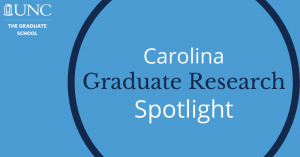Carolina’s global leadership in research relies on the collaborative work of faculty and graduate students. Close to 30% of the total enrollment at UNC-Chapel Hill, graduate students make research contributions in many academic fields – from medicine to musicology and beyond. In an ongoing series, The Graduate School is featuring content, in a variety of forms, highlighting graduate student work in advancing discovery.
In January 2020, a UNC-Chapel Hill faculty member and two colleagues at the University of Missouri applied for a national grant to develop and pilot high school curricular material focused on a novel coronavirus with potential to emerge in the United States.
The researchers received the National Science Foundation Rapid Response Research, or RAPID, grant. They had recruited 10 teachers in Missouri who were ready to work with them in presenting lessons about the scientific and social aspects of viral epidemics. Face-to-face meetings would advance collaborative lesson design, and the actual instruction would take place in the classroom.

That was the plan. By the March start date, however, “everything had changed,” says Troy Sadler, the Thomas James Distinguished Professor of Experiential Learning within the UNC-Chapel Hill School of Education.
As COVID-19 became a major crisis in the United States, Sadler and co-principal investigators Patricia Friedrichsen and Laura Zangori had to be responsive to developments and flexible with day-to-day challenges that emerged. Teachers were concerned, Sadler says, about the mental health needs of their students and worried about the potential for anxiety in studying COVID-19. The research team worked with a pediatric psychologist to appropriately address teacher concerns.
“One thing that came up was that the pandemic is creating anxiety, but a focused learning experience in which students have the opportunity to better understand the science about what is going on can actually be really helpful to the mental health of the students,” Sadler says.
The design process and actual instruction shifted to an online setting. Molly Ewing, a UNC-Chapel Hill doctoral student in education and member of the research team, helped develop instructional activities and synthesize teacher and student feedback throughout the spring. Among her contributions to the project, she suggested a way that students might use concept maps to better understand how COVID-19 policies influence different stakeholders.
“I care about K-12 students having the opportunity to learn science in a way that helps them make sense of their world,” she says. “Instead of just learning about various science topics, students should be figuring out answers to questions of interest, relevance or consequence. This project does that by supporting students as they begin to make sense of COVID-19, both scientifically and socially.”

Now that the school year has concluded, Sadler says his team will concentrate on reviewing feedback and creating a cohesive curricular unit that teachers can implement in the upcoming school year. Li Ke, a postdoctoral research associate in the School of Education, is a member of that team and has worked with Sadler on several research initiatives that bring real-world situations into classrooms.
“We know from our previous work that issue-based teaching and learning can promote students’ motivation to learn science, develop their understanding about how science works and, more importantly, prepare them to be responsible citizens that leverage scientific knowledge to make informed decisions in their lives,” says Ke.
Read more about Sadler’s study in this School of Education story: NSF funds project to build science lessons centered on coronavirus epidemic

